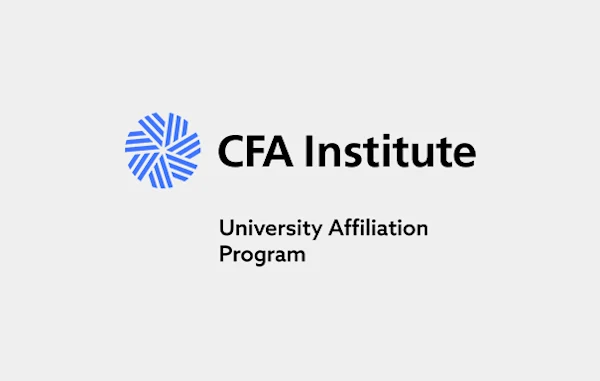
Master of Science in Financial Analysis

CFA Institute University Affiliation Program
Our Master of Science in Financial Analysis program is part of the CFA Institute University Affiliation Program. It is recognized by CFA Institute as embedding at least 70% of the CFA® Program Candidate Body of Knowledge™ (CBOK) from the CFA Program into our curricula.
Why Choose College for Financial Planning®?
Skills & Recognition
A master’s degree shows you have reached a high level of expertise. A graduate degree in personal financial planning is immediately recognizable to both clients and firms.
CFA Institute University Affiliation Program
Our Master of Science in Financial Analysis program is part of the CFA Institute University Affiliation Program. It is recognized by CFA Institute as embedding at least 70% of the CFA® Program Candidate Body of Knowledge™ (CBOK) from the CFA Program into our curricula.
Knowledge for the CAIA® exam
In addition, a unique portion of the master’s degree includes some of the CAIA® Charter exam curriculum, helping you prepare for the CAIA® exam.In addition, a unique portion of the master’s degree includes some of the CAIA® Charter exam curriculum, helping you prepare for the CAIA® exam.
Prior Learning Credit
If you completed your required education for CFP® certification through the College, you may qualify for up to 15 hours of transfer credit toward our master’s in personal financial planning program, which could put you halfway toward earning your degree.
If you hold the CFP®️certification and completed your required education elsewhere, you may be eligible for up to 9 credits.
Kaplan Schweser Review Materials
After students successfully complete fifteen (15) credit hours in the online MSFA program, they will have access to Kaplan Schweser’s CFA® Essential Study Package to prepare for the CFA exam. This access as part of the MSFA program will continue even upon graduation from the master’s program.
Program Learning Objectives
Graduates should be able to:
Know: Identify appropriate tools, techniques, and fiduciary responsibilities used in financial analysis in complex situations for firms and institutional and individual clients.
Apply: Apply accounting, economic, and quantitative methods and analyses in financial analysis used in various client-based scenarios and situations.
Relate: Relate the practice of portfolio management according to ethical standards.
Critical Analysis and Evaluation: Synthesize a sophisticated level of critical evaluation and analysis to financial analysis scenarios and apply advanced techniques in security analysis, asset allocation, and portfolio management for a firm and/or client.
Communicate: Prepare comprehensive written reports and effective presentations of financial analysis.
Professional Practice: Employ ethical and professional standards when making financial analysis and recommendations, abiding by regulatory and legal guidelines.
Lifelong Learning: Engage with the CFA Institute in being contemporary and adopting changes in the financial analysis industry, including related standards and regulations.
Discovery: Engage in learning and adopting new thinking in financial analysis including such areas as valuation, corporate performance, and portfolio management as it may apply to contributing to a firm and/or advising clients on complex financial analysis situations.
Program Curriculum
You must complete 30 semester credits with a minimum 3.00 grade point average to graduate from the program.

Topics Include
Economic analysis utilized in investment decision making
Financial statement analysis
Quantitative methods and analysis beneficial to financial analysis
The investment environment including financial markets and institutions
Corporate finance
Security analysis and valuation
Alternative investments, derivatives, and risk management
Advanced portfolio management
Professional standards and ethics in the investments industry
Core Courses
ACCT545: Financial Statement Analysis
ACCT550 Advanced Financial Statement Analysis
ECON535 Economics for Financial Analysis
FINA515 The Financial System, Markets and Instruments
FINA525 Quantitative Methods
FINA565 Security Analysis and Valuation
FINA575 Corporate Finance
FINA585 Derivatives and Alternative Investments
FINA595 Portfolio Management
FINA650 Financial Analysis Capstone
CFA®, Chartered Financial Analyst®, and CFA Institute logo are registered trademarks owned by CFA Institute. CFA Institute is the administrator of the CFA Program and the grantor of the CFA designation.
CFA Institute: Kaplan Schweser is a CFA Institute Prep Provider. Only CFA Institute Prep Providers are permitted to make use of CFA Institute copyrighted materials, which are the building blocks of the exam. We are also required to update our materials every year and this is validated by CFA Institute.
Our products and services substantially cover the relevant curriculum and exam and this is validated by CFA Institute. In our advertising, any statement about the numbers of questions in our products and services relates to unique, original, proprietary questions. CFA Institute Prep Providers are forbidden from including CFA Institute official mock exam questions or any questions other than the end of reading questions within their products and services.
CFA Institute does not endorse, promote, review, or warrant the accuracy or quality of the product and services offered by Kaplan Schweser.
Demand for Financial Analysts: https://www.bls.gov/ooh/business-and-financial/financial-analysts.htm.
CAIA®: CAIAA does not endorse, promote, review, or warrant the accuracy of the products or services offered by Kaplan, Inc., nor does it endorse any pass rates claimed by the provider. CAIAA is not responsible for any fees or costs paid by the user to Kaplan, Inc., nor is CAIAA responsible for any fees or costs of any person or entity providing any services to Kaplan, Inc. CAIA®, CAIA Association®, Chartered Alternative Investment AnalystSM, and Chartered Alternative Investment Analyst Association® are service marks and trademarks owned by CHARTERED ALTERNATIVE INVESTMENT ANALYST ASSOCIATION, INC., a Massachusetts nonprofit corporation with its principle place of business at Amherst, Massachusetts, and are used by permission. Kaplan Schweser’s exam preparation products are not available to residents of countries or regions subject to technology or economic and/or trade sanctions by the Office of Foreign Assets (OFAC) or other authorities including Cuba, Iran, North Korea, Syria, or Ukraine (Crimea Region).